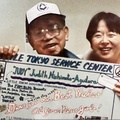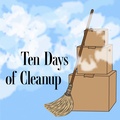Chapter 5 >>
For weeks after Haru’s baby brother Kei was born, the Shishido household was both loud and quiet at the same time. Loud from the baby’s crying but quiet as if secrets were being muffled in the corners of their dirt floors. Haru herself tried to stay out of her parents’ way. She thought that they would be happy, joyous that there was finally a new member in their family after waiting for so many years. But Mama would often break down as she nursed Kei, and Papa, instead of doting on his new son, spent most of his time in the strawberry fields.
As Haru studied her Japanese textbook sitting against the outside wall of their wood shack, she’d wonder if she had dreamed it all. Had Auntie Himeko really said, futago, twins? Did the midwife really carry another baby out of their house and get into a truck driven by Uncle Saburo? And why was Uncle Saburo staying away from their house? He hadn’t stopped by ever since Kei was born.
Haru couldn’t come out and ask these questions to her parents. Her mother’s strange sadness, her father’s stoicism, meant that something was very wrong. She couldn’t hurt her parents by prying and acting like a baby. No, she was going to find out what was happening on her own. She followed the dirt road and walked and walked, feeling the stones and bumps on the ground through the holes in her shoes.
Finally she stood in front of a Victorian house. Uncle Saburo’s. Once Papa had lived there, she knew, but then “nanika atta.” Something happened. Haru wasn’t sure what that was, but again, she never dared to ask.
She moved a couple of vegetable crates in front of the house’s picture window and spied inside. Uncle Saburo’s home was so fancy and grand with hardwood floors and sitting chairs. Haru wasn’t supposed to know, but she had found out that Uncle Saburo had been married once. But his wife got tired of urusai uncle with all of his complaints, demands, and eccentricities (at least that was what Auntie Himeko said to Mama), and she fled with a peach picker to Fresno. A simple peach picker! And Uncle Saburo with his glamorous house! For the wife to run away from that meant uncle had been especially awful, Auntie Himeko remarked. And for once, Haru had to agree with her.
“What are you doing here?”
Haru almost fell off of the crates and managed to jump safely in a pile of weeds.
Uncle Saburo was walking up his dirt driveway with a Japanese woman. It was Miss Senzaki, the barber’s daughter. In her arms was something wrapped in a blanket.
“Whose baby is that?”
“Senzaki-san’s,” Uncle Saburo quickly said. “You shouldn’t be so rude and question adults.”
Haru stared at Miss Senzaki. She had gone to the barber when Papa got his hair cut right before Kei was born. Miss Senzaki had been there, sweeping the floor. She was as skinny as a hat rack back then as she was now.
The baby moved in the blanket and Haru stepped forward to take a look.
“Get out of here,” Uncle Saburo said. “You’re not welcome.”
Haru blinked hard, causing tears to stream down her face. First Mama, then Papa. Now Uncle Saburo was telling her to go away. Ever since Kei was born, nobody seemed to care about her.
“Ike—” Uncle Saburo growled in Japanese.
Haru ran down the dirt driveway and then stopped midway. Her Nihongo book! She turned, just in time to see Uncle Saburo retrieving a red book from the weeds. Papa had been using the margins of that book to record his famous formula for the best strawberry variety ever. Lately he had forgotten all about it. And now it was in Uncle Saburo’s hands. Probably lost forever.
***
“Why did you call my husband about poisoned strawberries?” The well-coiffed fifty-something Asian woman clutching her designer purse repeated herself.
Sayuri didn’t know how this stranger was able to charge her way into her and Greg’s apartment, but she did.
“Your husband?” Sayuri weakly replied. She had e-mailed, called, and faxed dozens of people in Canada, anyone who might be able to give her more information about the seniors who had died recently from food poisoning.
“Well, my ex-husband, actually. Dr. Adrian Block.”
“Oh, the one in Toronto.”
“Yes, Toronto.” The woman stuck out her business card. Phyllis Hamakawa. Councillor, it read, Toronto. Toronto was on the other side of North America. For this woman to travel all the way to Oxnard, California to interrogate Sayuri meant serious trouble.
“Please sit. Would you like anything to drink?” Sayuri decided that she needed to play it Kyoto-style. Be gracious and polite, but deft enough to move away from this woman’s verbal bullets.
“Actually I need to use your bathroom.”
Sayuri tried to nod as demurely as a geisha and gestured towards the bathroom. As soon as Phyllis disappeared into the hallway, Sayuri turned her attention to the kitchen wall, where she had plastered photocopies of the Nihongo textbook and the mysterious strawberry formula scribbled in its margins, the strange pattern that vandals had created in the strawberry fields, and finally a map of Canada with pins inserted where recent food poisoning incidents had occurred. She tugged at the edge of the map, but the tape she had used kept the paper securely on the wall. This looked like the work of a crazy woman—at least that’s what Greg kept saying. They had stopped sleeping in the same bed weeks ago.
***
Phyllis took a quick look in the Shishidos’ medicine cabinet, a trick she had learned from her ex-husband. When they were still young and together, they would regularly sneak into their host’s master bathroom. Adrian would then analyze all the prescription drugs—“oh, they’re trying to get pregnant,” “things must not be going well—he’s on anti-depressants.” It was a game for Adrian, then a struggling med student who had no money, eager to delight in his wealthier peers’ physical weaknesses. But Phyllis soon got tired of the game, and eventually of Adrian.
But here she was, being as sneaky and crass as her ex. But this was different. This was in the name of her grandmother. Phyllis expected to find some pills for a bipolar disorder, something that would indicate that the young Japanese woman was not quite right. Sunscreen, Tylenol, Pepto-Bismol. Nothing out of the ordinary.
Phyllis turned on the faucet and studied her face. Her mascara was running from the heat. It must be at least 30 degrees warmer here in California. After reapplying her lipstick, she smoothed the slight wrinkles in her pant suit. She wasn’t preparing for a press conference, but something much more important. Avenging Obaachan’s death.
She returned to the shoe-box living room, only to note Sayuri attempting to tear down a mosaic of photocopied newspaper articles and documents taped to a map of Canada on the kitchen wall.
“This looks like some kind of crime investigation,” Phyllis couldn’t help to murmur. She stepped closely to the wall, examining how each piece of information seemed to link to another. Her eyes stopped at the pin on Toronto and an article from the Internet about the death of an older Japanese Canadian woman. Itsuko Nagashima. Baa-chan.
Phyllis’s head began to pulse and she wished that she had some of the Tylenol that was in the bathroom medicine cabinet. So this had not been some crazy coincidence. This Sayuri Shishido was somehow connected to the poisoning at the retirement home.
The young Japanese woman must have noticed Phyllis’s reaction. “There’s been some strange things happening around here,” Sayuri tried to explain. “At my husband’s farm.”
“Your husband has a farm?”
“Well, it is his family’s farm. They grow strawberries.”
Phyllis’ face darkened. So this is what it was all about—serial killing via strawberries.
“I’m not saying our farm was involved in the poisonings,” Sayuri tried to explain.
Phyllis felt like she had fallen into a dark hole. Despite her normal appearance, this woman had to be unstable. Weren’t the ones who seemed harmless the most dangerous of all? Phyllis took a few steps back and cleared her throat. “You know, I just remembered—I have an appointment in half an hour.” She continued backing out towards the front door. She then quickly left down the cement walkway towards her rental car.
“Wait—maybe we can help each other,” Sayuri called out from the open door.
Yeah, I bet, thought Phyllis, hitting the automatic unlock button on the car alarm.
Once she was secured into her car, Phyllis took out her cell phone. She knew the American system, dial 9-1-1, but that was for more basic forms of murder. Gunshot, stabbing, drowning, fire. Not death by strawberries. No, Phyllis would have to build her case, slowly and meticulously. And she knew exactly who to call for help.
***
There was something about Jorge Yamashita that was strange. Greg Shishido couldn’t quite put his finger on it. But for a humble strawberry grower from Paraguay, he seemed to know too much. He understood the latest technology about irrigation, pesticide control, and even the development of new varieties. Greg knew that more and more strawberries were being grown in South America. But this man’s know-how seemed larger than his simple operation back home.
Jorge was hiding something from his personal life, for sure. He had said that his wife had died in Paraguay. When his father Bob asked him about children, Jorge remained silent for a moment. “No. No, children,” he said. “I have no one in this world.”
For Bob’s generation, a man’s action was enough. If a man worked hard and proved himself out in the fields, he got the benefit of the doubt. Greg, on the other hand, depended on something less concrete. The World Wide Web. He started off with Google and then with Zip’s help, broke into some Spanish-language search engines. Finally, they were able to get some information about Yamashita Farms from a strawberry distribution website.
“Funny,” commented Zip.
“What?” Greg stared at the screen filled with Spanish language.
“You know how Jorge said that he only dabbled in strawberries?”
“Yes.”
“Well, his company’s been supplying strawberries to Canada for the past three years.”
“Canada.” That’s where all those older people were dying.
“You can ask him tomorrow morning. I think that he’s already left for the day.” Zip, like Bob, still believed that Jorge was legit. The phone on the other desk rang and Zip went over to answer it.
Greg stared at the screen for a moment and then went to the filing cabinet to look for employee records. Yamashita, Jorge. There was an address that looked familiar. Greg punched in the number and street into the computer. It wasn’t an apartment, but a hotel.
***
After Bisabuelo taught him how to shoot a gun, Carlos Yamashita was now hopelessly addicted to the firearm. He couldn’t wait until Father left the hotel in the early semi-darkness. Quickly getting up and not even bothering to change out of his Spiderman pajamas, he walked outside to a fallow field and set up target practice.
In the backpack he carried was the gun, of course, and all the soda cans that he had collected from the hotel trashcan by the elevator. He now knew the name of the gun, a Glock, from an old television show he saw in the hotel a week earlier. As the sun began to rise, reflecting light on the aluminum cans, Carlos took aim. Bang, bang, bang. Each can flew up and then disappeared in the clumps of soil. Carlos also learned that the funny attachment to the gun’s barrel was called a silencer and it did exactly what the name implied—it made the gun go silent.
Shooting a real gun was better than any Gameboy game. If only his friends back in Paraguay could see him. They would be so impressed.
But he knew that he could not let his father know about the gun. He wouldn’t approve, and Bisabuelo warned him to keep the Glock a secret between them. Carlos used to be afraid of the old man, but now he was beginning to like him. Bisabuelo trusted him. You are a big boy, he said. Father, on the other hand, was becoming more and more distant. Because Carlos didn’t go to school, Bisabuelo was virtually his only friend.
By the time the sun was fully visible, Carlos knew that it was time for him to go back to the hotel. Placing the pieces of the cans and the gun in his backpack, he made the mile walk to the parking lot. It was sunrise, and usually no one was up except truckers ready to get on the road. But this morning there was a thin Asian-looking man leaning against a truck in the hotel parking lot. Sipping coffee, the man glanced up to the second floor of the hotel. He could not be looking at their hotel room, could he? No, Carlos was just imagining it. He gripped the straps of his backpack tighter as he pressed the button for the elevator.
As he reached the second floor, Carlos looked over the railing down towards the parking lot. See, Carlos, he told himself. The man was not there anymore. He must have been waiting for a friend.
Carlos used the key card to get into the room and let out a deep breath. Bisabuelo had told him not to speak to anyone besides him and Father. That there were people in Oxnard who would want to hurt all three of them. It was up to Carlos to be Father’s bodyguard.
Carlos began getting ready to take a shower when he saw the outline of a person outside the window. It was too early for the maid. Somebody began rapping at the door. Carlos’s heart began to beat faster. Had he properly closed the door? Sometimes the edge of the rug would keep the door open.
The doorknob began to turn. Carlos ran to the bed where his backpack lay. His hand wrapped around the Glock and then squared his shoulders towards the door. He was ready to do whatever it took to protect himself and his family.
* “The Nihongo Papers” is a work of fiction. The characters, incidents, and dialogue are drawn from the author’s imagination and are not to be construed as real. Any resemblance to actual events or persons, living or dead, is entirely coincidental.
© 2008 Naomi Hirahara





